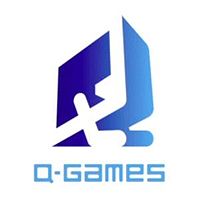- Q-Games
-
Not to be confused with Q Entertainment.
Q-Games 
Type Public Industry Video games Founded August 9, 2001[1] Headquarters Nakagyō-ku, Kyoto, Japan Key people Dylan Cuthbert (President/Managing Director)
Kenkichi Shimooka (Vice-President/Director)[1]Products Digidrive, Star Fox Command, PixelJunk series Parent Independent Q-Games is a video game developer based in Nakagyō-ku, Kyoto, Japan.[2] It has a mixture of foreigners and Japanese nationals on staff and works closely with both Nintendo and Sony.[1]
Contents
Foundation
Q-Games was founded by Dylan Cuthbert,[3] who previously worked at Argonaut Software and helped create Starglider and Starglider 2 for Argonaut Software, then X and the first Star Fox for Nintendo. He also developed Star Fox 2 to completion before heading off to work at Sony America to make Blasto on the PlayStation. After this, Dylan moved back to Japan to work at Sony Japan, where, in early 1999, he developed the Duck in a Bath technical demo (Ducks demo) that showcased the PS2's power to early developers and publishers.[4] Following that, he developed Pipo Saru 2001 and then left Sony to start Q-Games Ltd. in Kyoto in September 2001.
History
The first few years were spent accumulating staff and developing behind-doors technology projects for a number of clients including Sony and Microsoft. At E3 2004, they showed two graphic technology demos[5][6] for the PlayStation Portable and then internally began development on two games, one for the Game Boy Advance and one for the Nintendo DS. These titles have since been announced as Digidrive (part of the bit Generations series of puzzle games for the Game Boy Advance) and Star Fox Command respectively. Both have since been released.
Following these projects, Q-Games began to collaborate with Sony Computer Entertainment, becoming a second-party studio partner, by developing the PixelJunk series of downloadable games for the PlayStation 3. They are available for download and purchase on the PlayStation Network Store worldwide. PixelJunk games are presented in 1080p full HD. PixelJunk made its worldwide debut on 11 July 2007 at E3 2007, held in Santa Monica, CA. At TGS 2009, Q-Games confirmed that it is extremely unlikely these games will ever appear on the Xbox 360.[7] The concept behind the PixelJunk series was to take innovative ideas for games and create something fun and reasonably priced for PlayStation 3 users. Work on games developed under the PixelJunk label is carried out by small teams over a few months.
Q-Games have also worked with Nintendo again, releasing several games for the Nintendo DSi's DSiWare digital distribution service.
Games developed
Game Title Release Platform Notes Digidrive July 27, 2006 Game Boy Advance Part of the Bit Generations series Star Fox Command August 28, 2006 Nintendo DS PixelJunk Racers September 13, 2007 PlayStation Network PixelJunk Monsters January 24, 2008 PlayStation Network PixelJunk Monsters Encore April 24, 2008 PlayStation Network Expansion pack/add-on to PixelJunk Monsters PixelJunk Eden July 31, 2008 PlayStation Network PixelJunk Monsters Deluxe October 1, 2009 PlayStation Portable Art Style: Intersect October 2, 2009 DSiWare Port of Digidrive Trajectile November 24, 2009 DSiWare Known as Reflect Missile in PAL regions PixelJunk Shooter December 10, 2009 PlayStation Network Starship Defence December 18, 2009 DSiWare Known as Starship Patrol in PAL regions X-Scape May 31, 2010 DSiWare Known as X Returns in Japan and as 3D Space Tank in PAL regions PixelJunk Shooter 2 March 1, 2011 PlayStation Network Sequel to PixelJunk Shooter Star Fox 64 3D September 9, 2011 Nintendo 3DS Remake of Star Fox 64, co-developed with Nintendo EAD PixelJunk SideScroller October 22, 2011 PlayStation Network PixelJunk 4am November 2011 PlayStation Network Currently in development Other projects
As well as games development, Q-Games still develops technology directly with Sony Japan for the PlayStation 3. The PS3's XMB (Xross Media Bar) interface, background and music visualisers were developed by Q-Games and they are credited with 3D Graphics Technology in the About PS3 section of the PS3's OS.
PlayStation Home
On September 24, 2009, Q-Games released their own developer space for their hit series, PixelJunk in the PlayStation 3's online community-based service, PlayStation Home to the Japanese version and on October 9, 2009 to the North American version. The "PixelJunk Museum" (Japan), or "PixelJunk Exhibition" (North America), features the games PixelJunk Eden, PixelJunk Monsters, and PixelJunk Racers. For PixelJunk Eden there are glass wall art displays, for PixelJunk Monsters, there are displays of familiar characters from the game, and for PixelJunk Racers, there are displays of two different race cars. There is also a virtual shop in the space selling PixelJunk virtual items. In Japans version from September 24, 2009 to October 9, 2009, near the shop, there was a panel that took users to a virtual version of Q-Games TGS 2009 Booth. Called the "Q-Games virtual public TGS Booth", it was a virtual recreation of the Q-Games TGS 2009 Booth that had a free t-shirt and a video screen.[8] On December 17, 2009, they released another exhibition room to the "PixelJunk Exhibition" space. This room is to display PixelJunk Shooter and is called the "PixelJunk Shooter Mother Ship Hangar."
References
- ^ a b c "Q-games Profile". Q-Games.com. http://www.q-games.com/prof.shtml. Retrieved 2009-08-08.
- ^ "Q-Games Contact." Q-Games. Retrieved on September 17, 2010. "Arte Oike 3F Oshinisinotouin-cho 612 Nakagyo-ku, Kyoto, Japan 604-0042."
- ^ [1]
- ^ [2]
- ^ http://www.watch.impress.co.jp/game/docs/20040513/psp32.htm
- ^ http://www.watch.impress.co.jp/game/docs/20040513/psp33.htm
- ^ "PixelJunk Appearing On Xbox 360: Extremely Unlikely". Gaming Union. 2009-10-07. http://www.gamingunion.net/news/pixeljunk-appearing-on-xbox-360-extremely-unlikely--486.html. Retrieved 2009-10-07.
- ^ "PixelJunk Museum". SCE. http://translate.google.com/translate?prev=hp&hl=en&js=y&u=http://playstationhome.jp/member/lounge/pixel.html&sl=ja&tl=en&history_state0=.
Sources
- Chris Kohler's book Power-Up: How Japanese Video Games Gave the World an Extra Life - Chapter 6.
- An Interview on Gamasutra.com with Q-Games(English)
- Dylan Cuthbert's profile on N-Sider.com(English)
- Dylan Cuthbert video interview on the 1-UP Show (English)
External links
Categories:- Companies based in Kyoto Prefecture
- Companies established in 2001
- Video game companies of Japan
- Video game developers
Wikimedia Foundation. 2010.
